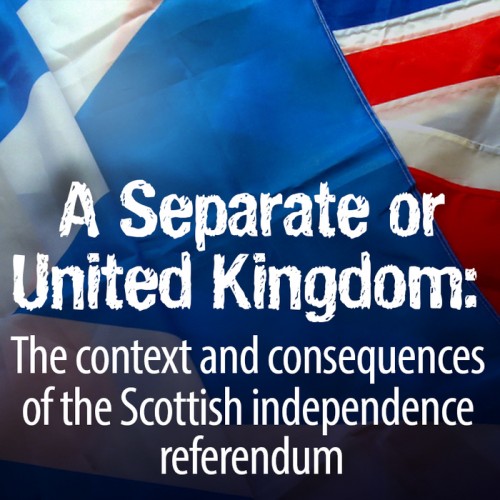Much of the discussion around the relevance of migration and migrants to the Scottish independence debate revolves around the effects of independence on current immigration policies in Scotland and the rest of the UK. But in the last two centuries, Scotland’s population change has been characterised more by emigration than by immigration.
Clear data on the actual size of the Scottish diaspora are hard to come by and are critically dependent on how one chooses to define ‘Scottish diaspora’. The number of people born in Scotland and living outside the UK, for example, is estimated at about 200,000, while about 850,000 Scottish-born people are believed to live elsewhere in the UK (Shaw 2013). These relatively modest numbers are dwarfed, though, by estimates of the size of the ‘Scottish diaspora’ using looser interpretations of the term that include those with more distant Scottish ancestry, in particular those who still consider themselves to be, in some way, Scottish. When these more distant ‘Scots’ are included, estimates of the size of the diaspora increase to more than 30 million (Sim 2011) – with some suggesting the number could be as high as 100 million. Clearly, larger numbers relate to those whose sense of Scottishness is based on more distant heritage – potentially going back several generations – or even less tangible relationships with Scotland.
But while there may be much debate over the size or correct definition of the Scottish diaspora, it seems clear that a strong and enduring sense of ‘Scottish’ identity is important enough to be a fundamental part of the personal identity of many descendants of Scottish emigrants. Understanding why defining oneself as Scottish seems to have such an appeal to so many people in far-flung locations, who furthermore are often many generations removed from Scotland itself, is also difficult.
Scotland’s presence in popular culture may play a role. The romanticised depictions of Scotland in films such as Brigadoon, Brave or Highlander, enduringly popular songs such as Mull of Kintyre or The Skye Boat Song (Dougal 2011) and in a global ‘tartan and castles’ portrayal of the nation may be largely artificial (Butler 2002), but have contributed to a sense of a Scottish ‘global brand’ that seems to resonate with many people around the world who have latched onto their Scottish heritage as a defining identifier, as evidenced by the scale of ‘ancestry tourism’, discussed below.
The role of family names also may be important. The fact that many people have surnames that are easily identified as linked to Scottish clans – often with a Mc or Mac prefix – provides ancestral identity and de facto membership in a sort ‘club’ with its roots not only in Scotland, but often in a very specific part of Scotland.
All told, the choice to identify with ancestors from Scotland may well be linked to a clear – if sometimes slightly tenuous – ethnic identity, supported by traditions, symbols, art and a ‘club’ of easily identified members around the world for many people (Carr and Landa 1983).
Scottish identity and the Scottish economy
Considering the challenges in even establishing the precise nature or size of the Scottish diaspora, it is also, of course, difficult to quantify its economic ramifications for Scotland. But certain economic implications of the modern ‘diaspora’ can be examined and quantified. Efforts by people who feel connected to Scotland through their ancestry to reconnect with their ‘home’ by visiting and exploring Scotland is a major industry. Ancestry tourism is currently estimated to drive some 800,000 visits to Scotland each year, and to be worth more than £400m for the Scottish economy.
Other economic implications can be less tangible, but nonetheless important. Like other governments reaching out to their diaspora populations, the Scottish government has been actively pursuing business people with Scottish heritage (or other connections), whose sense of ‘Scottishness’ or kinship with Scotland could be harnessed to improve opportunities for international trade or development of skills in Scotland. The Globalscot network was designed specifically to identify people from outside Scotland who are of Scottish descent, or who have another connection with Scotland, and who are willing to share their skills and expertise to help develop Scottish industries.
A strong Scottish identity, of the same type that encourages diasporic identification among large numbers of people, is also important for Scotland’s export industry, in particular the sale of products such as Scotch Whisky, which draw heavily on the romantic picture of Scotland, outlined in the previous section, in their marketing to global consumers. Scottish whisky, in particular, is sold to those keen to buy not only a high-end product, but also one with a perceived authenticity, and the industry is worth some £4.3 billion per year.
Scottish emigration and independence
The enduring and powerful sense of what it means to be Scottish may, in many respects, be a construct of sentimental depictions of the place, but – regardless of whether it is based on ancestry, a love of the real place or on Braveheart and shortbread tin imagery – the diaspora’s relationship with Scotland does have real economic and social consequences for the nation.
What role this has played in shaping the current independence debate is hard to say, but it seems certain that the diaspora will continue to affect the social and economic development of Scotland, regardless of whether it chooses to vote for independence or to continue to be part of the United Kingdom.
The diaspora also has important implications for Scottish citizenship. There are more than 1 million Scottish-born people living outside Scotland who could, should they choose to, become Scottish citizens under the terms laid out by the Scottish government’s White Paper on independence. But the White Paper also suggests that eligibility for citizenship in an independent Scotland will be granted on the basis of descent as well. Specifically, citizens of any country with a parent or grandparent who qualifies for Scottish citizenship will themselves be eligible for Scottish citizenship (if they can provide documentation of this link). Eligibility alone would not, of course, mean that this element of the Scottish diaspora would all choose to become Scottish citizens, much less to reside in Scotland, but all would be eligible to ‘register’ as Scottish citizens.
Scottish identity is clearly attractive for many members of the Scottish diaspora – however one chooses to define it – around the world. It has economic and social ramifications for the nation and has shaped Scotland’s international profile in a way that is likely to have had ramifications for the independence debate.
Whether Scottish citizenship and independence would be a stimulus for immigration by members of this diaspora is considerably less clear. While a strong Scottish identity has certainly helped maintain a global community which identifies with Scotland – and helped Scotland pack an impressive cultural punch around the world – it is just one of many factors that may affect its immigration or emigration flows.
This post is part of “A Separate or United Kingdom“, our blog series analysing the issues surrounding the Scottish referendum.
An earlier version of this article appeared on the Migration Observatory website.
References
- Butler, Richard W. “The Traditional Tourist Image of Scotland,” in Destinations: Cultural Landscapes of Tourism, edited by Greg Ringer, 121. London: Routledge, 2002.
- Carr, Jack L., and Janet T. Landa. “The Economics of Symbols, Clan Names, and Religion.” The Journal of Legal Studies 12, no. 1 (1983):135.
- Dougal, Josephine. “Singing Home: Re-locating Scottishness in Diaspora.” Paper presented at the 4th Global Conference on Diasporas: Exploring Critical Issues, Mansfield College, Oxford, 4-6 July 2011.
- Shaw, Jo. “Citizenship in an Independent Scotland: Legal Status and Political Implications.” CITSEE Working Paper Series 2013/34, University of Edinburgh, 2013.
- Sim, Duncan. “The Scottish Community and Scottish Organisations on Merseyside: Development and Decline of a Diaspora.” Journal of Scottish Historical Studies 31.1 (2011):99-118.










1 Comment
Thanks for this really interesting article. I’m a Scot who’s been living in Barcelona for the last three years, and find that my own sense of Scottish identity seems to be much more important to the Catalans who surround me than it has ever been to me. Conversations on possible self-rule are ineluctable – just last night, a taxi driver spent the entire journey lecturing me loudly on why both Scotland and Catalonia should be independent. Other people attempting to foist a sense of national identity onto me is something I find fascinating, if infuriating.
You mention “it seems certain that the diaspora will continue to affect the social and economic development of Scotland, regardless of whether it chooses to vote for independence or to continue to be part of the United Kingdom.” Of course, as a Scot living abroad, I don’t get to vote in the upcoming referendum, so any direct influence over Scotland’s future is somewhat limited.